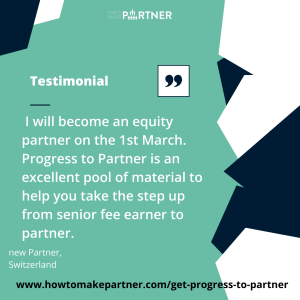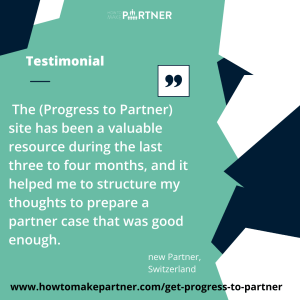If you will make partner (or even director in some firms) you will need a persuasive Business Case. After all, not many partnerships are prepared to give up a slice of their profits to someone who is just a ‘good pair of hands’ or a trusted team member. The problem is that (as far as I am aware) no one actually trains you on how to create, write or pitch your Business Case.
This is why I am asked time and time again for a Business Case template for partnership. Good business cases typically answer 3 questions which allow your partners to assess your suitability for partnership. This article will take you through these 3 questions.
There is no standard when it comes to Business Cases for partnership
Sadly there is normally no such thing as a standard “Business Case template for partnership”. Sorry. This is because all firms, lawyers, consultants and accountants are different. They all have different:
- partnership admissions processes
- expectations for what is required in your Business Case
- forms to fill in
- way of building a profitable practice within a practice.
In fact, having worked with many accountants, tax advisors and consultants from across the Big 4, even the individual regions and firms have different expectations and processes. By way of example, a business case submission for the Big 4 will normally be a mini-book, with incredibly detailed plans and projections. Whereas a business case for a law firm is more often than not much more than a breakdown of your historical billing and work won, with a 12-month business development plan and overall 3-year goals.
The nearest you will find to a Business Case template for partnership is our Free Sample Business Case Template (click on the link to download)
 One of the most sought-after courses in our Progress to Partner Academy is called “How to Build a Cast-Iron Business Case for Partner”. It will take you step-by-step through the process to build, articulate and then pitch your Business Case for partnership.
One of the most sought-after courses in our Progress to Partner Academy is called “How to Build a Cast-Iron Business Case for Partner”. It will take you step-by-step through the process to build, articulate and then pitch your Business Case for partnership.
We think membership of Progress To Partner Academy is a must-have in your arsenal of tools and guidance to help with your career progression. Within it is a section on the Partnership Admissions process with guides and recordings to help you find your way through the system. Check it out!
Let’s go back to basics on what actually is expected from your Business Case for partner
Your Business Case is where you demonstrate the commercial promise of making you up to partnership. It is where you show your partners how you will increase the firm’s profits. If you are wondering what your Personal Case is and how this differs from your Business Case, your Personal Case is where you demonstrate you meet the criteria expected of a partner. Typically the core of your Business Case will be your business plan. This is where you answer the first of the 3 questions your Business Case needs to address: How will I make more profit for the firm than I take out as drawings? Therefore, your firm will normally expect it to contain this information:
- Your overall growth strategy for the next 3 years (and it is normally a 3-year time horizon your partners are interested in)
- A detailed 12-month business development plan, i.e. exactly what you are going to do to generate your 1st year’s turnover targets
- Your resourcing plans (essential for Big 4 firms, not normally expected for law firms)
- Any critical success factors
Your Business Case is where you take your business plan and use it to answer the final 2 critical questions.
- Why admit me to the partnership?
- Why now? i.e. what’s the risk of keeping me at Director/Senior Associate?
Admittedly, as you are reading this I suspect that you are thinking that a Business Case template for partnership would come in handy right now! The nearest you will find to a Business Case template for partnership is our Free Sample Business Case Template (click on the link to download)
This is exactly why we created the ‘Creating Your Cast-Iron Business Case For Partnership‘ self-study course.
Unless you are in management consultancy, most of us have not been trained in business planning. So creating and writing a Business Case is very new to most of us. And a skill we need to master rapidly, as it’s really important for our future career success. Is it any wonder that so many people request a Business Case template for partnership from me?
So we put together the step-by-step process of taking my clients from the Big 4 down to the regional law firms, into my self-study course ‘Creating Your Cast-Iron Business Case For Partnership‘.
In fact, one law firm so liked this course and its impact on one of their new partners that they told their staff that no-one goes on partner track without doing this self-study course. (I know, I was pretty chuffed when I heard this too)
What is in the Creating Your Cast-Iron Business Case For Partnership self-study course?
 My Creating Your Cast-Iron Business Case For Partnership self-study course has been designed to bridge the gap for people in professional services firms. I.e. the training you need to create and pitch your business case. The course takes you through:
My Creating Your Cast-Iron Business Case For Partnership self-study course has been designed to bridge the gap for people in professional services firms. I.e. the training you need to create and pitch your business case. The course takes you through:
- Exactly what makes a good Business Case
- The 7 different types of Business Case and what needs to be included for each different type
- The 5 things you really need to consider in order to make sure your plans for your future practice are future-proof and attractive to your partners
- The STAGe framework which makes it easy for anyone to create a 3-year strategy for their strategy
- What needs to go into your 12-month business development plan (and how this will subtly be different depending on whether you are contentious, deal lead or service large accounts or sell in large projects)
- How to write your Business Case so your partners take notice of you and what you are proposing to do
Here is a taster of the first video from module 1 of the course – What makes a good Business Case for partnership?
What’s in Progress To Partner which will help you with your Business Case for partner?
Progress to Partner is our membership site that will give your the knowledge AND confidence to fly through this final step up to partner.
It’s like a Netflix for your career in the professions. Find what you need to watch or read at the time you need it. Within the site you’ll find over 150+ courses, videos, checklists, templates and plans to help you progress your career to partner. Amongst the many curated resources (no more unnecessary scrolling or searching) you’ll find:
- On-demand courses on how to create and articulate your business case, including our most downloaded course “How to Build a Cast-Iron Business Case for Partner”
- A section on the Partnership Admissions process with guides and recordings to help you find your way through the process with your sanity intact.
- Recordings and checklists on how to ace your partner panel interview
- On-demand courses on how to win the right sort of clients
- Proven advice on how to still do the day job and find the time to get through the Partner Track process








